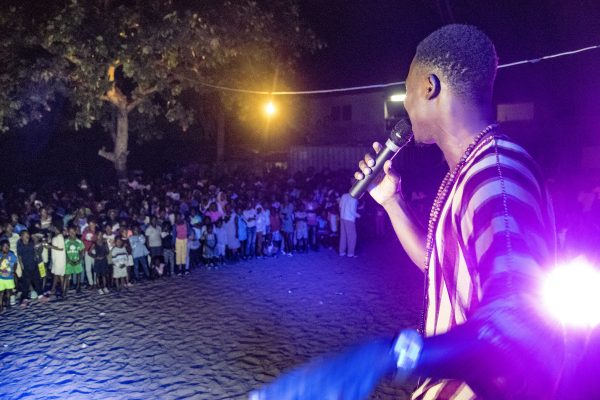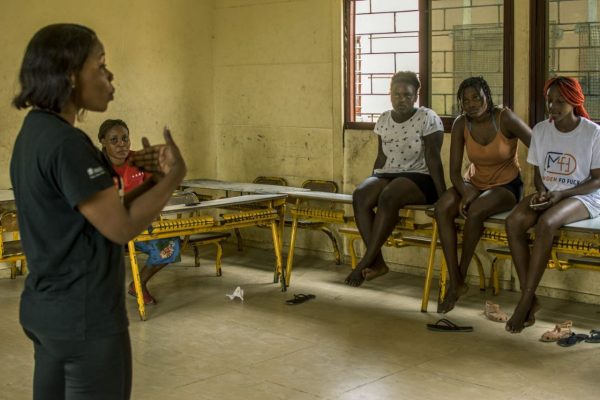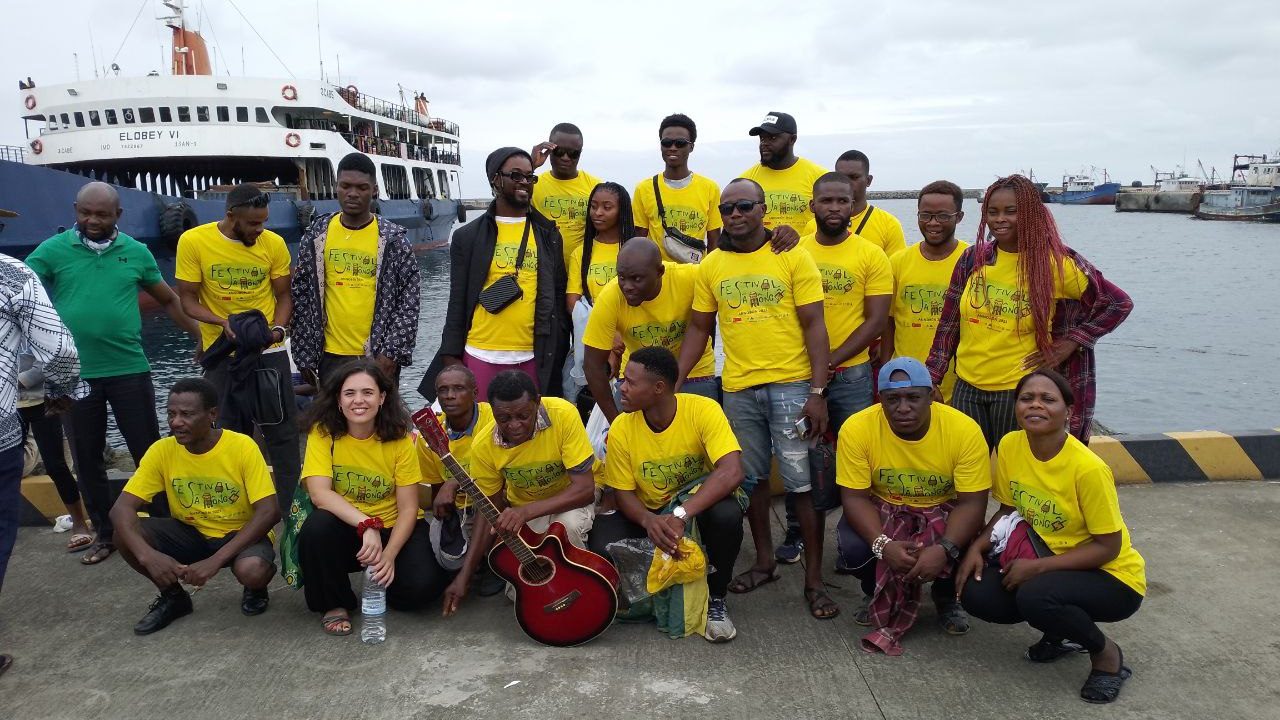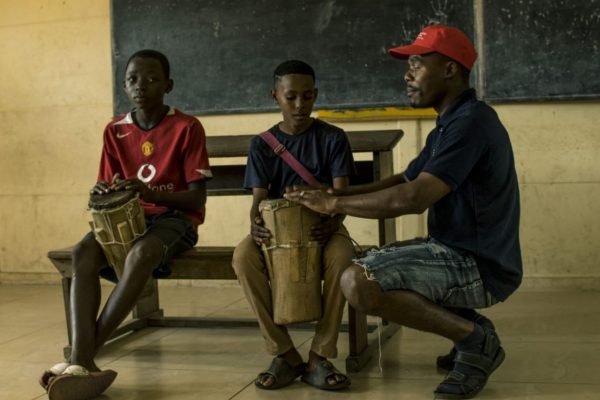
A boat brings back joy. Celia Zayas recounts her experiences of Festival Sãlôngô in the island of the sleepy volcano.
“Annobón! Land!”, cried someone.
Kids stood quickly and went to the deck to see the emerging land. I stood there, lying on the improvised common bed we had built on the floor.
“It’s just four. We will not be arriving until six or seven,” someone said, turning his back to continue sleeping.
We had been on the boat for four days. An old cargo ship with no cabins and capacity for 50 comfortably-seated passengers in a room, had been home for over 400 people and tons of fuel for the town’s generator, bags of rice, boxes of oil, building materials, water and other basics sent by relatives, that had no other way to arrive in Annnobón.
After sleeping one on top of the other, over the luggage, next to the engines, and on every little corner safe from the wind and the cold for three nights, sharing a single toilet room, everyone was thrilled to arrive. Furthermore, many were returning to their homeland after years of being away. This boat being the only means of transportation to and from Annobón, once a month, and announced only two days in advance, makes it difficult for people to keep ties with their island.
For some of us, the trip meant a discovery; we were about to hold the very first festival in the history of the island.
Annobón: the where.
Annobón is a sleepy volcano of 22 km2 in the middle of the Atlantic Ocean, in the Gulf of Guinea. It belongs to Equatorial Guinea, yet its closest neighbor is São Tomé e Príncipe, with whom relations are almost non-existent. Geographically, and symbolically, Annobón is a far place relative to neighbouring lands.
Annobón is home to the Ambo or Annobonese people, one of the six ethnic groups of Equatorial Guinea, but most of them do not live in Annobón. Lack of resources, transportation, food, employment, communications – 3G-net arrived only in December 2022 – frequent electricity shortages and limited access to education (only primary school can be completed on the island), force people to migrate to other parts of the country, where they usually establish themselves permanently.
Still, they keep longing and dreaming of this central African paradise island, full of fishes, whales, dolphins, tuna, forests, rivers and lakes, where kids learn to swim and fish before they are even able to walk. Perhaps this has made Annobón a land of poets, writers and musicians, despite the difficult living conditions. Outside, they keep the dream alive through the Ambo culture: a language, fá d’Ambo, unique music and dance styles, spirituality, traditions, and a common and complex history emerging from colonization(s), oppression(s), creativity and community. Yet, for many, Ambo culture is a dying culture.
In a globalized world with clear cultural hegemonies, surviving as a (very) minoritarian culture requires political will and resources, both of which are lacking in this case. The absolute lack of protection, systematization or recognition measures, and a general perception of the Ambo culture not being useful for scaling up in the social ladder, as it is not an asset for employment, nor is it linked to power spheres, rather the opposite, complete the picture. For many young Ambo people, their culture does not have value, and their island does not have a future. Some others want to change that.
“In a globalized world with clear cultural hegemonies, surviving as a (very) minoritarian culture requires political will and resources.”
Logistically, politically, and socially, development agencies or big organizations have worked little to none in Annobón. Historically, the island has been left behind and the situation has not changed much, even after Equatorial Guinea became an upper-middle-income country due to oil reserves discovered in the 1990s. But we were a group of young people with little to lose. Toiñ Bull, a young Ambo singer, a prominent figure in the cultural Ambo sphere, and a community activist, came up with the idea: what could show the value of traditional culture, while giving opportunity to young people, and disrupting the routine, all at once, in Annobón? A cultural festival.
Festival Sãlôngô is a story.
We are back in the boat. It is 9 am, and we see the island in front of us, an enormous green volcano with houses on its slope. People are walking like little ants making their way to the harbour to receive their relatives, who will be arriving with a new rice bag, frozen meat or soap, which they receive with a smile.
“We are here, finally”, says Gines, an Ambo-ndowé poet and the accountant of the team. It is his first time visiting Annobón, his mother’s land. For him, the Festival Sãlôngô means knowing his own roots.
By 11 am, we were already established in the primary school. The local government had offered us the space for camping and conducting workshops, a local business lent mattresses to us, and the regional hospital lent us their few mosquito nets. Food, water, sound materials and backpacks were all over the place, after being transported from the boat – we had to bring everything from the capital, so as not to make the only supermarket on the island run out of groceries and water – but all 60 people, artists, volunteers, organization, and trainers, were happy.
For five days, the town changed. At the school, we taught. We put in place the program “Xima Ja Pe Tela” (sow in your land), a training program on Ambo cultural expressions through music, drums and woodcraft, and on entrepreneurship and cultural management to ensure some continuity of activities. However, with children accounting for the larger demographic group of the island, the children’s space was the most successful. There, youngsters learnt traditional stories, important places, traditions and spirituality of Annobón.
In the afternoons, kids were thrilled by traditional sports competitions, all linked to the beach and the sea, as the most important place in Annobón, and traditional gender stereotypes were challenged, as when a woman, dressed up in her best dress, reached second place in the rowing race.
During the evenings, the magic happened.
A team of volunteers, led by Bob, had built a stage with wood and palm leaves on the beach. Every evening, children, teenagers and older women were gathered around to see the shows and old and iconic musicians and young emerging talents that came to the stage. Once the show ended, everyone went to the town square to dance banx keré-keré, a social and iconic Ambo dance that had not been danced in Annobón for years. Recovering heritage.
“Everyone went to the town square to dance banx keré-keré, a social and iconic Ambo dance that had not been danced in Annobón for years.”

Travel with me again. It is Tuesday, August 22. Desmali and D’Ambo da Costa are on stage. The group play drums, and Desmali sings and plays pandê. There are less than ten people in the world that play guitar in this Ambo genre, no one does it like him, an old man in his seventies. Desmali is back in his hometown after seven years, due to the festival, and the entire town is there to see him.
“Ayayayayayayyyyy, mi Sonita, tu belleza me dejooo fascinadooo”, he starts his most famous song, a love song for Sonita.
In a second, people came near the stage and started dancing in pairs. Everybody signs; many people film. The air feels emotional, and I feel tears on the verge of my eyes. We all know we are witnessing a historical moment. Perhaps, it will be the last time that Desmali sings in his hometown.
“The air feels emotional, and I feel tears on the verge of my eyes.”
He looks to the crowd, with bright eyes and a timid smile. We all cheer him up.

Culture is community.
Festival Sãlôngô was, in the end, much more than we had expected. We felt it was a feat. Besides a pathway full of obstacles, from logistics to funding, the most difficult part had been to be welcomed, and to engage people. After decades of young, active people being forced to leave the island seeking their future, those who stayed lost the habit of participating and engaging, which had been replaced by strong skepticism. . However, Festival Sãlôngô is not just a cultural event. It is an opportunity to bring quality cultural activities to rural areas where public events have disappeared through time , an occasion to inspire children and teens, and a long-term process for supporting women, elders and young people. It is a space for building communities that can talk about who they are and who they want to be.
From the inside, it is also an experiment. In a context where ethnicities are political, and stereotypes and prejudices shape human relations, Festival Sãlôngô gathered young people from different ethnicities to visit, work and live together in Annobón, the most unknown place in the country. Those who were from there could show their homeland to those who were not, who felt it as a new place to belong, and to care for. Older artists, with solid careers, met and worked with younger ones, creating new symbiotic bonds that stay until today.
Now, the adventure continues. We embark on our second edition in July 2024. The boat is getting ready to go, and everyone wants to jump in.
We wonder if some of the children who learnt drums last year are now fantastic percussionists of chia jantá (Ambo music genre), or if they have been practicing for the young talents’ competition.
I have spent the entire evening sending emails, looking for funding. It is difficult. I have a new message. A group of old women want to deliver a workshop on knitting, for other women. It will be an occasion to meet and talk, they say.
I smile; this proves that it all makes sense.
We still have a long road until our second Festival Sãlôngô.
But Sãlôngô means passion.
Celia Zayas is an expert on cultural cooperation and gender equality. She is a co-organizer, curator and communicator of Festival Sãlôngô. She is a participant of European Alternatives’ Democracy, Elections, Mentoring & Organizing (DEMO) project).
Note: Festival Sãlôngô was possible thanks to the support of the Spanish Cultural Centres in Malabo and Bata, the Government of Equatorial Guinea, and the contributions of artists, individual donors, volunteers and trainers. You can contribute by following us or donating to our crowdfunding.



